Fleurs du Mal Magazine


Or see the index
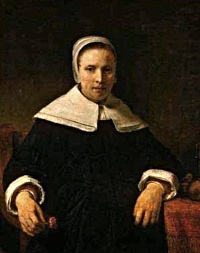
Anne Bradstreet
(1612-1672)
In Thankful Remembrance For
My Dear Husband’s Safe Arrival
Sept 3, 1662
What shall I render to Thy name
Or how Thy praises speak?
My thanks how shall I testify?
O Lord, Thou know’st I’m weak.
I owe so much, so little can
Return unto Thy name,
Confusion seizes on my soul,
And I am filled with shame.
O Thou that hearest prayers, Lord,
To Thee shall come all flesh
Thou hast me heard and answered,
My plaints have had access.
What did I ask for but Thou gav’st?
What could I more desire?
But thankfulness even all my days
I humbly this require.
Thy mercies, Lord, have been so great
In number numberless,
Impossible for to recount
Or any way express.
O help Thy saints that sought Thy face
T’ return unto Thee praise
And walk before Thee as they ought,
In strict and upright ways.
Anne Bradstreet poetry
fleursdumal.nl magazine
More in: Archive A-B, Bradstreet, Anne
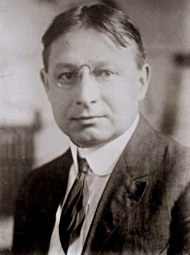
Ellis Parker Butler
(1869-1937)
A Lost Angel
When first we met she seemed so white
I feared her;
As one might near a spirit bright
I neared her;
An angel pure from heaven above
I dreamed her,
And far too good for human love
I deemed her.
A spirit free from mortal taint
I thought her,
And incense as unto a saint
I brought her.
Well, incense burning did not seem
To please her,
And insolence I feared she’d deem
To squeeze her;
Nor did I dare for that same why
To kiss her,
Lest, shocked, she’d cause my eager eye
To miss her.
I sickened thinking of some way
To win her,
When lo! she asked me, one fine day,
To dinner!
Twas thus that made of common flesh
I found her,
And in a mortal lover’s mesh
I wound her.
Embraces, kisses, loving looks
I gave her,
And buying bon-bons, flowers and books,
I save her;
For her few honest, human taints
I love her,
Nor would I change for all the saints
Above her
Those eyes, that little face, that so
Endear her,
And all the human joy I know
When near her;
And I am glad, when to my breast
I press her,
She’s just a woman, like the rest,
God bless her!
Ellis Parker Butler poetry
fleursdumal.nl magazine
More in: Archive A-B, CLASSIC POETRY

Anne Bradstreet
(1612-1672)
The Flesh And The Spirit
In secret place where once I stood
Close by the Banks of Lacrim flood,
I heard two sisters reason on
Things that are past and things to come.
One Flesh was call’d, who had her eye
On worldly wealth and vanity;
The other Spirit, who did rear
Her thoughts unto a higher sphere.
“Sister,” quoth Flesh, “what liv’st thou on
Nothing but Meditation?
Doth Contemplation feed thee so
Regardlessly to let earth go?
Can Speculation satisfy
Notion without Reality?
Dost dream of things beyond the Moon
And dost thou hope to dwell there soon?
Hast treasures there laid up in store
That all in th’ world thou count’st but poor?
Art fancy-sick or turn’d a Sot
To catch at shadows which are not?
Come, come. I’ll show unto thy sense,
Industry hath its recompence.
What canst desire, but thou maist see
True substance in variety?
Dost honour like? Acquire the same,
As some to their immortal fame;
And trophies to thy name erect
Which wearing time shall ne’er deject.
For riches dost thou long full sore?
Behold enough of precious store.
Earth hath more silver, pearls, and gold
Than eyes can see or hands can hold.
Affects thou pleasure? Take thy fill.
Earth hath enough of what you will.
Then let not go what thou maist find
For things unknown only in mind.”
Anne Bradstreet poetry
fleursdumal.nl magazine
More in: Archive A-B, Bradstreet, Anne
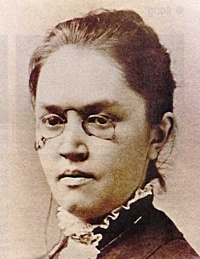
Katharine Lee Bates
(1859-1929)
Blood Road
The Old Year groaned as he trudged away,
His guilty shadow black on the snow,
And the heart of the glad New Year turned grey
At the road Time bade him go.
“O Gaffer Time, is it blood-road still?
Is the noontide dark as the stormy morn?
Is man’s will yet as a wild beast’s will?
When shall the Christ be born?”
He laughed as he answered, grim Gaffer Time,
Whose laugh is sadder than all men’s moan.
“That name rides high on our wrath and crime,
For the Light in darkness shone.
“And thou, fair youngling, wilt mend the tale?”
The New Year stared on the misty word,
Where at foot of a cross all lustrous pale
Men raged for their gods of gold.
“Come back, Old Year, with thy burden bent.
Come back and settle thine own dark debt.”
“Nay, let me haste where the years repent,
For I’ve seen what I would forget.”
“And I, the first of a stately train,
The tramp of a century heard behind,
Must I be fouled with thy murder-stain?
Is there no pure path to find?”
The Old Year sneered as he limped away
To the place of his penance dim and far.
The New Year stood in the gates of day,
Crowned with the morning star.
Katharine Lee Bates poetry
fleursdumal.nl magazine
More in: Archive A-B, CLASSIC POETRY

Ellis Parker Butler
(1869-1937)
Circumstantial Evidence
She does not mind a good cigar
(The kind, that is, I smoke);
She thinks all men quite stupid are,
(But laughs whene’er I joke).
She says she does not care for verse
(But praises all I write);
She says that punning is a curse,
(But then mine are so bright!)
She does not like a big moustache
(You see that mine is small);
She hates a man with too much “dash,”
(I scarcely dash at all!)
She simply dotes on hazel eyes
(And mine, you note, are that);
She likes a man of portly size;
(Gad! I am getting fat!)
She says champagne is made to drink;
(In this we quite agree!)
And all these symptoms make me think
Sweet Kate’s in love with me.
Ellis Parker Butler poetry
fleursdumal.nl magazine
More in: Archive A-B, CLASSIC POETRY
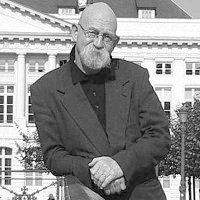
Tweespraak aan rivier
Weet je nog? De droom van de stroom door het huis?
Wat?
Van de openende deuren, en de daarachter weer
openende deuren? Van het licht op het water?
Zijn er nog grenzen?
Meer dan ooit. Iedere stroom heeft zijn eigen grens.
Alleen juiste wachtwoorden helpen.
Weet je nog toen we hier voor het eerst waren?
Ja, de geschiedenis was nog niet begonnen.
Het duurde lang voor de rivier haar bedding vond.
Een boom dreef langs. Nog groen, met een vogelnest.
Alleen de oudste sporen leiden overal heen.
Droom.
Kijk me niet zo aan.
Droom.
Maar hoe gaat dat dan?
Zoals as valt op asfalt.
Bert Bevers
Verschenen in Gierik & Nieuw Vlaams Tijdschrift, Antwerpen, maart 2016
fleursdumal.nl magazine
More in: Archive A-B, Bevers, Bert

Passer domesticus
Zijn schroomvol hopen op een kleine holte
onder schuine dakpannen vergt steeds meer
tijd. Hij hunkert naar nabijheid van toonloos
dorre struiken, naar van kreupelhout de lege
grijste. Het vaakst zie ik hem nog in de Zoo.
Daar kronkelt in hoekjes hout dat hij graag
heeft, wordt hij door papegaaien bij het eten
in hun kooien als een kleine broer aanvaard.
Slapen zie ik hem nooit. Om het stoere snaveltje
glanst constant een vogeltjesglimlach. Hij hupt
en roetsjt met graagte in de buurt. Hij wil meer.
Hij wil u wel nabij zijn maar toch niet al te zeer.
Bert Bevers
Uit: Eigen terrein – Gedichten 1998-2013, Uitgeverij WEL, Bergen op Zoom, 2013
fleursdumal.nl magazine
More in: Archive A-B, Bevers, Bert
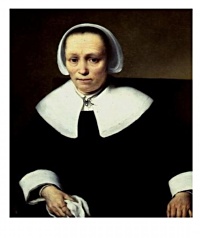
Anne Bradstreet
(1612-1672)
By Night When Others Soundly Slept
By night when others soundly slept
And hath at once both ease and Rest,
My waking eyes were open kept
And so to lie I found it best.
I sought him whom my Soul did Love,
With tears I sought him earnestly.
He bow’d his ear down from Above.
In vain I did not seek or cry.
My hungry Soul he fill’d with Good;
He in his Bottle put my tears,
My smarting wounds washt in his blood,
And banisht thence my Doubts and fears.
What to my Saviour shall I give
Who freely hath done this for me?
I’ll serve him here whilst I shall live
And Loue him to Eternity
Anne Bradstreet poetry
fleursdumal.nl magazine
More in: Archive A-B, Bradstreet, Anne

Anne Bradstreet
(1612-1672)
The Author to Her Book
Thou ill-form’d offspring of my feeble brain,
Who after birth didst by my side remain,
Till snatched from thence by friends, less wise than true,
Who thee abroad, expos’d to publick view,
Made thee in raggs, halting to th’ press to trudge,
Where errors were not lessened (all may judg).
At thy return my blushing was not small,
My rambling brat (in print) should mother call,
I cast thee by as one unfit for light,
Thy Visage was so irksome in my sight;
Yet being mine own, at length affection would
Thy blemishes amend, if so I could:
I wash’d thy face, but more defects I saw,
And rubbing off a spot, still made a flaw.
I stretched thy joynts to make thee even feet,
Yet still thou run’st more hobling then is meet;
In better dress to trim thee was my mind,
But nought save home-spun Cloth, i’ th’ house I find.
In this array ’mongst Vulgars mayst thou roam.
In Criticks hands, beware thou dost not come;
And take thy way where yet thou art not known,
If for thy Father askt, say, thou hadst none:
And for thy Mother, she alas is poor,
Which caus’d her thus to send thee out of door.
Anne Bradstreet poetry
fleursdumal.nl magazine
More in: Archive A-B, Bradstreet, Anne

Ellis Parker Butler
(1869-1937)
An Exception
In all romances, old and new,
And in all lover’s rhymes
I find one rule that has held true
Since prehistoric times.
The lover must, if he indeed
Be hit by Cupid’s dart,
Grow pale, sigh much, neglect his food,
And wholly lose his heart.
Now fain would I abide this rule
But I, forsooth, grow red
And hot, and stammer like a fool,
And only lose my head.
Ellis Parker Butler poetry
fleursdumal.nl magazine
More in: Archive A-B, CLASSIC POETRY
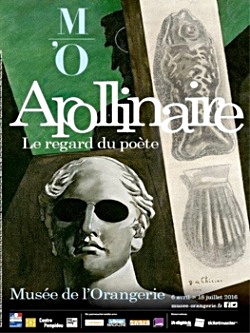 Musée de l’Orangerie, Paris
Musée de l’Orangerie, Paris
Apollinaire, the vision of the poet
Until 18 July 2016
The exhibition Apollinaire, the Eyes of the Poet looks at the period between 1902 and 1918 when Guillaume Apollinaire was active as an art critic. This period of fifteen years, seemingly a brief span, would in fact see a prodigious concentration of schools, manifestos, experiments and discoveries flourishing throughout the arts. Apollinaire’s character, his artistic sensitivity and his insatiable curiosity, made him a witness, a participant and a privileged intermediary in the turbulent times of the early 20th century. With a keen eye for discovering the art of his time, Apollinaire “defined once and for all the approach of artists like Matisse, Derain, Picasso and Chirico (…) using intellectual surveying techniques not seen since Baudelaire” Breton declared in 1952.
The aim of this exhibition is to recognise the important effect that this poet-critic’s discerning eye had on his era, in much the same way as Baudelaire and Mallarmé had on theirs.
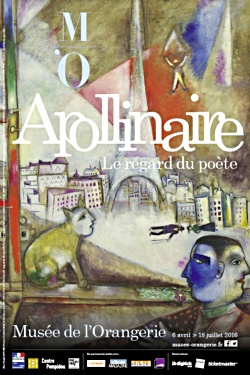 Poet, critic, friend of artists and one of the first to discover African arts, Apollinaire proved to be a key player in the aesthetic revolution that led to the birth of modern art.
Poet, critic, friend of artists and one of the first to discover African arts, Apollinaire proved to be a key player in the aesthetic revolution that led to the birth of modern art.
This exhibition aims to explore Apollinaire’s mental and aesthetic universe through a thematic display: from Douanier Rousseau to Matisse, Picasso, Braque and Delaunay, from Cubism to Orphism and Surrealism, from academic sources to modernity, from tribal arts to popular arts. One section will highlight in particular the poet’s links with Picasso.
The exhibition sits quite naturally in the Musée de l’Orangerie alongside the works collected by his friend Paul Guillaume, whom Apollinaire introduced into the avant-garde circles, and whose adviser he became.
Musée de l’Orangerie
Jardin des Tuileries
Place de la Concorde
Paris fr
+33 (0)1 44 77 80 07
+33 (0)1 44 50 43 00
Jours et horaires d’ouverture
Ouvert de 9h à 18h
Dernier accès : 17h15
Fermé le mardi
# Website: Le musée de l’Orangerie
fleursdumal.nl magazine
More in: Apollinaire, Guillaume, Archive A-B, Art & Literature News, Art Criticism, Exhibition Archive, FDM in Paris, SURREALISM

Anne Bradstreet
(1612-1672)
Before The Birth Of One Of Her Children
All things within this fading world hath end,
Adversity doth still our joys attend;
No ties so strong, no friends so dear and sweet,
But with death’s parting blow is sure to meet.
The sentence past is most irrevocable,
A common thing, yet oh, inevitable.
How soon, my Dear, death may my steps attend.
How soon’t may be thy lot to lose thy friend,
We both are ignorant, yet love bids me
These farewell lines to recommend to thee,
That when that knot’s untied that made us one,
I may seem thine, who in effect am none.
And if I see not half my days that’s due,
What nature would, God grant to yours and you;
The many faults that well you know
I have Let be interred in my oblivious grave;
If any worth or virtue were in me,
Let that live freshly in thy memory
And when thou feel’st no grief, as I no harms,
Yet love thy dead, who long lay in thine arms.
And when thy loss shall be repaid with gains
Look to my little babes, my dear remains.
And if thou love thyself, or loved’st me,
These O protect from step-dame’s injury.
And if chance to thine eyes shall bring this verse,
With some sad sighs honour my absent hearse;
And kiss this paper for thy love’s dear sake,
Who with salt tears this last farewell did take.
Anne Bradstreet poetry
fleursdumal.nl magazine
More in: Archive A-B, Bradstreet, Anne
Thank you for reading Fleurs du Mal - magazine for art & literature